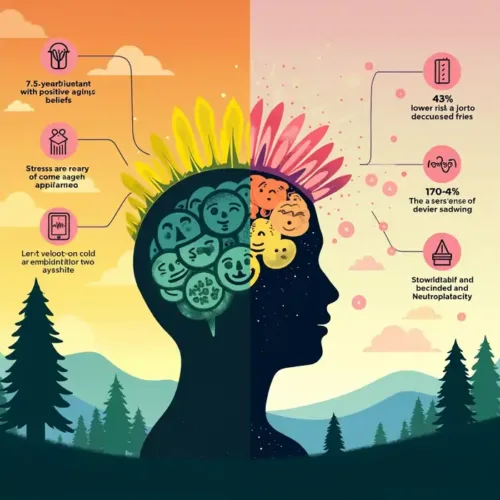How to Keep Your Brain Sharp After 40: Science-Backed Daily Habits

Did you know that one in nine adults over 45 reports experiencing confusion or memory loss? The Centers for Disease Control shares this sobering statistic, which serves as a wake-up call for anyone concerned about how to keep your brain healthy as you age.
But here’s some good news. Research shows we can prevent cognitive decline through simple good health habits. Physical activity, quality sleep patterns, and promoting social connections play significant roles in brain health. Engaging in regular brain exercise can also help maintain cognitive function as we grow older.
Your brain continues to adapt and grow well past 40. People with higher education levels who engage in lifelong learning show better mental functioning as they age. Research reveals that individuals who believe they can improve memory work harder to maintain it – and they succeed!
We’ve compiled science-backed strategies that can boost your cognitive function. The brain-boosting MIND diet and 150 minutes of weekly moderate exercise are practical steps that keep your mind sharp and active. These proven daily habits can protect and strengthen your brain health after 40. Let’s explore them together.
Why Your Brain Changes After 40
“The brain can be continuously and consistently enriched throughout your life no matter your age or access to resources.” — Sanjay Gupta, Neurosurgeon and Chief Medical Correspondent for CNN
Your brain starts aging earlier than you might think. Most people notice cognitive changes starting at age 40, and these changes speed up after this milestone [1]. This fact might worry you, but knowing these changes can help you maintain your brain health proactively and potentially prevent Alzheimer’s.
Normal vs. Concerning Cognitive Changes
Your brain goes through natural changes in midlife. You might process information more slowly and find it harder to remember things. Research shows that people over 45 experience subtle changes in their short-term memory and ability to multitask [2]. Your brain also gets smaller, starting in your 30s and 40s. The rate of shrinkage increases around age 60 [3].
These natural changes affect the frontal lobes and hippocampus—the parts of your brain that control executive functions and form memories [3]. That’s why you might walk into a room and forget what you went there to do [1].
Notwithstanding that, there’s a clear difference between normal aging and warning signs. The occasional memory slip is normal, but frequent forgetfulness that affects your daily life needs medical attention [1]. Subjective cognitive decline—when you notice your thinking abilities getting worse—affects about 11% of people over 45 and could point to early Alzheimer’s [1].
The Science of Neuroplasticity
Your brain shows amazing adaptability despite these changes. Neuroplasticity—your brain’s way of forming new neural pathways—continues throughout your life [4]. This means you can train your brain whatever your age [5].
Your brain goes through a dramatic “rewiring” in your fifties that connects various networks [6]. This reorganization makes up in part for declining resources and opens new possibilities. To name just one example, middle-aged adults often solve problems and use inductive reasoning better than younger people [2].
Research shows that while memory and processing speed might decline, your vocabulary and general knowledge can grow with age [7]. Your brain’s way of using life experience peaks in middle age. Scientists call this a “sweet spot” for certain types of decisions [2].
You can support your brain health by understanding these natural changes and using neuroplasticity. Mental challenges, physical activity, and social connections help keep your brain sharp as you age.
Resources:
National Institute on Aging: nia.nih.gov/health/brain-health
Alzheimer’s Association: alz.org/help-support/brain_health
Harvard Health: health.harvard.edu/topics/mind-and-mood
Morning Habits to Keep Your Mind Sharp
Your morning habits can keep your mind sharp throughout life. A brain-friendly morning routine builds the foundation for better cognitive function as you age. Let’s explore some of the best foods for brain health and how exercise and brain health are interconnected.
The Brain-Boosting Breakfast
The food you choose after waking affects your brain health by a lot. Your brain needs proper fuel to function well after the overnight fast. Neuroscientists recommend drinking two to three glasses of water right after waking up to help cognitive function [8]. Your gut plays a direct role in brain health by producing neurotransmitters that affect your mood and cognitive abilities [8]. The gut microbiome’s influence on brain function is an emerging area of research in cognitive health.
Your brain works best with these power foods:
Berries and nuts: Blueberries contain flavonoids that slow cognitive decline, while walnuts give you essential omega-3s [9]
Leafy green vegetables: Rich in vitamin K and folate that promote brain cell growth [10]
Eggs: Supply choline for brain health (found in the yolks) [9]
Greek yogurt: Gives protein to keep glucose levels steady [10]
Neurologists recommend filling half your breakfast plate with fruits and vegetables, a quarter with protein, and a quarter with whole grains [9]. Including olive oil in your morning meal can also provide additional benefits for brain health.
Exercise Routines That Boost Brain Function
Your brain benefits right away from morning physical activity. 15-20 minutes of movement increases blood flow to your brain and helps you form new neural connections [8]. A single workout raises dopamine, serotonin, and noradrenaline levels—giving you better mood and focus for at least two hours [11].
A morning walk can give you substantial cognitive benefits. Research shows that spending time in outdoor green spaces helps you concentrate better and think more clearly [11]. The effects of physical activity on the brain are profound, contributing to improved memory, reduced risk of cognitive decline, and enhanced overall brain health.
Mindfulness Practices for Mental Clarity
Just 5-10 minutes of daily meditation activates your prefrontal cortex—the brain region that handles planning, decision-making, and focus [12]. This practice lowers cortisol and epinephrine levels, which helps regulate your blood pressure and breathing patterns [8].
Meditation helps synchronize your whole brain and improves creativity, learning, attention, and focus [8]. You’ll build resilience against life’s challenges as you learn to observe thoughts without judgment [12]. This mindfulness practice is an excellent form of brain exercise that can help improve memory and cognitive function.
Resources:
Harvard Medical School: health.harvard.edu/blog/regular-exercise-changes-the-brain-to-improve-memory-thinking-skills
National Institute on Aging: nia.nih.gov/health/cognitive-health
American Heart Association: heart.org/en/healthy-living/fitness/fitness-basics/why-is-physical-activity-so-important-for-health-and-wellbeing
Daytime Strategies for Optimal Brain Health
“As a primer, here are the five pillars of brain health: Move, Discover, Relax, Nourish, Connect.” — Sanjay Gupta, Neurosurgeon and Chief Medical Correspondent for CNN
Your workday gives you plenty of chances to keep your brain sharp through smart daily habits. Scientists have found that your brain needs regular care throughout the day. It’s not just about morning or evening routines.
Work Breaks That Strengthen Neural Connections
Taking short breaks between tasks does more than just refresh you – it makes your brain work better, according to science. NIH researchers found that during these brief rest periods, your brain quickly replays compressed versions of activities you just practiced. This helps cement new skills [13]. The more your brain replays an activity while you rest, the better you’ll do next time.
Quick “micro-breaks” of 5-10 minutes between tasks stop mental fatigue from building up and boost your efficiency [14]. These short pauses let your neural networks recover. You can stretch, talk to coworkers, or just look out the window. These breaks are excellent opportunities for quick brain exercises to improve memory and cognitive function.
Brain-Friendly Nutrition Throughout the Day
The food you eat between meals affects your brain function by a lot. Experts say the MIND diet (Mediterranean-DASH Intervention for Neurodegenerative Delay) targets brain health specifically [15]. This diet, which combines elements of the Mediterranean diet with specific foods known to prevent dementia, is considered an effective Alzheimer’s prevention diet.
Add these brain-boosting foods to your daily meals:
Kale and spinach pack brain-healthy nutrients that slow down mental decline [1]
Berries contain flavonoids that help your memory work better [1]
Fatty fish has omega-3s that reduce beta-amyloid proteins linked to Alzheimer’s [1]
Walnuts are rich in alpha-linolenic acid that helps you score better on cognitive tests [1]
Some people also explore intermittent fasting or the ketogenic diet for potential cognitive benefits, though more research is needed in these areas.
Social Interactions That Stimulate Cognitive Function
Here’s something interesting – talking to people exercises your brain. Studies of older adults show that those who stayed most socially active had 70% less mental decline than those who didn’t socialize much [16]. Every conversation makes multiple parts of your brain work at once. You process faces, body language, tone, and content while thinking up responses [16].
Even quick chats during work hours make your brain sharper. Research shows people who have more pleasant social interactions do better on mental tasks that day and for two days after [17]. These social interactions are a form of brain exercise that can significantly contribute to cognitive health.
Resources:
National Institute on Aging: nia.nih.gov/health/cognitive-health
Alzheimer’s Association: alz.org/help-support/brain_health
Mayo Clinic: mayoclinic.org/healthy-lifestyle
Evening Routines for Cognitive Maintenance
Your evening routine can affect your brain health, especially after you turn 40 when brain aging accelerates. A well-planned nighttime routine could determine how sharp your mind stays as you age. Let’s explore some strategies for brain health for seniors that can be incorporated into your evening routine.
The Connection Between Sleep Quality and Brain Health
Sleep acts as your brain’s maintenance time. Your brain clears out built-up toxins during deep sleep, including beta amyloid and tau proteins linked to Alzheimer’s disease [18]. Research shows that less slow-wave sleep (deep sleep) is associated with higher beta amyloid levels, which might increase your risk of brain diseases [19].
Good sleep helps strengthen your memory pathways. Your brain combines memories and processes the day’s information while you rest [20]. This explains why poor sleep makes it hard to concentrate, learn, and solve problems.
You should get 7-9 hours of unbroken sleep each night to keep your brain healthy [21]. Stick to regular sleep and wake times—even on weekends. This will help you get more deep sleep phases [2].
Digital Detox for Better Brain Function
Blue light from your devices reduces melatonin production and disrupts sleep [22]. The content you watch before bed can keep your mind active when it needs to slow down [2].
Taking breaks from technology is a great way to get many cognitive benefits:
Better focus and concentration [22]
Lower stress levels and improved mood [22]
Better social connections [22]
Improved sleep quality [4]
Start by switching off all screens an hour before bed [2]. If that seems too hard, begin with smaller steps like turning off notifications or setting specific times without your phone [5].
Brain-Stimulating Activities Before Bed
Switch screen time with activities that help your brain. Reading paper books before bed helps you sleep better and boosts brain connections [2]. Board games, puzzles, and crosswords make your brain work in different ways at once [6]. These activities serve as excellent memory exercises for seniors and can help improve cognitive function in elderly individuals.
Light exercise like evening walks or relaxing yoga helps you sleep better while keeping your mind sharp [21]. Mindfulness activities like meditation or deep breathing lower your heart rate and blood pressure, which creates perfect conditions for good sleep [2]. These practices also contribute to stress reduction, which is crucial for maintaining cognitive health.
Resources:
National Institute on Aging: nia.nih.gov/health/cognitive-health
Sleep Foundation: sleepfoundation.org
Brain & Life Magazine: brainandlife.org
Conclusion
Science shows that your brain health after 40 depends on daily habits rather than quick fixes. Understanding natural cognitive changes enables you to take proactive steps to maintain brain health and potentially prevent Alzheimer’s.
A powerful defense against cognitive decline comes from morning brain-boosting nutrition, daytime work breaks, and evening sleep habits. On top of that, your neural pathways grow stronger when you stay physically active, maintain social connections, and keep your mind stimulated through various brain exercises.
Research confirms our brains adapt throughout life. These science-backed habits will protect your cognitive function as you age. Of course, simple daily actions like good nutrition, quality sleep, and regular exercise create most important brain health benefits as time passes. Adopting healthy eating patterns like the Mediterranean diet, incorporating leafy green vegetables and olive oil into your meals, and considering the role of vitamins and supplements can all contribute to better brain health.
Your future self will thank you when you start these proven strategies today. Note that brain health doesn’t require perfection but consistent, mindful choices that support your cognitive function with age. Remember, it’s never too late to start taking care of your brain and improving your cognitive health.
Additional Resources:
National Institute of Mental Health: nimh.nih.gov/health/topics/brain-basics
World Health Organization: who.int/health-topics/brain-health
Cleveland Clinic Brain Health: my.clevelandclinic.org/health/articles/brain-health
FAQs
Q1. What are some effective ways to maintain cognitive function after 40?
Regular exercise, a brain-healthy diet, quality sleep, social engagement, and continuous learning are key strategies. Aim for 150 minutes of moderate exercise weekly, follow the MIND diet, get 7-9 hours of sleep nightly, and challenge your brain with new activities.
Q2. How does sleep affect brain health in middle age and beyond?
Quality sleep is crucial for brain maintenance. During deep sleep, the brain removes toxins associated with neurodegenerative diseases and consolidates memories. Aim for 7-9 hours of uninterrupted sleep and maintain a consistent sleep schedule to support cognitive function.
Q3. What role does nutrition play in keeping the brain sharp after 40?
A brain-healthy diet is essential. Focus on foods rich in omega-3 fatty acids, antioxidants, and vitamins. Include berries, leafy greens, fatty fish, nuts, and whole grains in your diet. The MIND diet, which combines Mediterranean and DASH diet principles, is particularly beneficial for brain health and may help prevent dementia.
Q4. Can social interactions improve cognitive function in older adults?
Yes, social engagement significantly benefits brain health. Studies show that socially active older adults experience less cognitive decline. Each social interaction engages multiple brain regions, providing mental stimulation and potentially improving cognitive performance.
Q5. What are some brain-stimulating activities to incorporate into daily routines?
Engage in activities that challenge your brain, such as learning a new language, solving puzzles, or taking up a new hobby. Reading, playing board games, and practicing mindfulness can also enhance cognitive function. Additionally, taking short breaks during work to allow your brain to process information can improve overall cognitive performance.
References
[1] – https://www.health.harvard.edu/healthbeat/foods-linked-to-better-brainpower
[2] – https://www.wellandgood.com/health/nighttime-habits-for-brain-health
[3] – https://www.publichealth.columbia.edu/news/changes-occur-aging-brain-what-happens-when-we-get-older
[4] – https://thebraindocs.com/digital-detoxification-for-brain-health/
[5] – https://www.brownhealth.org/be-well/what-digital-detox-and-do-you-need-one
[6] – https://mqshealth.com/brain-stimulating-activities-for-elderly/
[7] – https://www.silverridgerecovery.com/the-midlife-adult-brain-how-receptive-is-it-to-c/
[8] – https://www.optimistdaily.com/2022/06/do-this-in-the-morning-for-peak-brain-health-according-to-neuroscientists/
[9] – https://www.prevention.com/food-nutrition/healthy-eating/g20503713/breakfasts-that-boost-your-brain/
[10] – https://www.today.com/health/diet-fitness/neurologists-eat-for-breakfast-brain-health-rcna99035
[11] – https://buffalorehab.com/blog/10-minute-brain-fog-fix-simple-morning-moves-for-a-sharper-mind/
[12] – https://www.mind.org.uk/information-support/drugs-and-treatments/mindfulness/mindfulness-exercises-tips/
[13] – https://www.nih.gov/news-events/news-releases/study-shows-how-taking-short-breaks-may-help-our-brains-learn-new-skills
[14] – https://pmc.ncbi.nlm.nih.gov/articles/PMC9432722/
[15] – https://www.brightfocus.org/resource/eating-for-brain-health/
[16] – https://www.health.harvard.edu/mind-and-mood/get-back-your-social-life-to-boost-thinking-memory-and-health
[17] – https://www.psu.edu/news/research/story/socializing-may-improve-older-adults-cognitive-function-daily-life
[18] – https://www.ahajournals.org/doi/10.1161/STR.0000000000000453
[19] – https://www.americanbrainfoundation.org/why-sleep-matters-for-brain-health/
[20] – https://www.heart.org/en/healthy-living/healthy-lifestyle/sleep/sleep-your-way-to-a-smarter-brain
[21] – https://integrative-psych.org/resources/enhancing-cognitive-sharpness-after-40-the-role-of-nightly-routines
[22] – https://health.clevelandclinic.org/digital-detox






